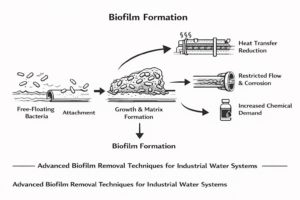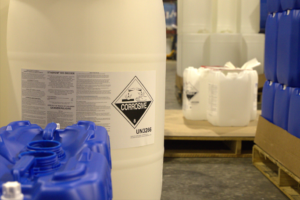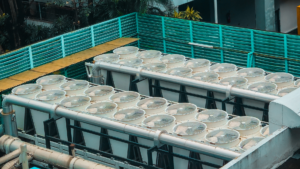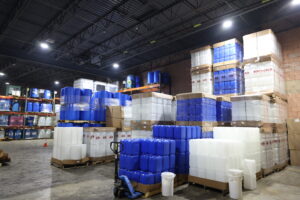Clean, safe drinking water additives play a vital role in protecting public health and ensuring the purity of every glass of water that reaches homes, schools, and facilities. As water utilities and treatment professionals know, even a few drops of the wrong chemical can affect water quality, taste, and long-term health effects. That’s why industry standards like NSF/ANSI/CAN 60 exist—to verify that every additive used in drinking water meets rigorous health-based criteria.
Developed through collaboration among regulators, scientists, and manufacturers, the NSF-60 standard ensures that drinking water treatment chemicals are carefully tested for contaminants, purity, and performance. It establishes limits for trace elements, heavy metals, and other potential impurities, giving utilities and consumers confidence in their overall health protection.
For organizations like ETI, which specialize in chemical blending for industrial and municipal water systems, NSF-60 certification isn’t just about compliance. It’s a commitment to providing safe, effective formulations that help facilities operate responsibly and sustainably. By using certified drinking water additives, operators safeguard both system integrity and community wellness—one carefully blended solution at a time.
What Is NSF/ANSI/CAN 60? Understanding the Standard
The NSF/ANSI/CAN 60 standard, often simply called NSF-60, was developed to protect the public from unsafe concentrations of drinking water treatment chemicals. It defines the minimum health-effect requirements for any chemical added directly to drinking water, ensuring that treatment processes improve purity without introducing harmful contaminants.
Originally created in partnership with the Environmental Protection Agency, NSF-60 establishes clear testing and evaluation procedures for every additive—from oxidation chemicals and coagulants to pH adjusters and corrosion inhibitors. Each product must undergo formulation review, laboratory analysis, and annual audits to verify that it meets the safety limits outlined by the standard.
A key component of NSF-60 is the single product allowable concentration (SPAC), which represents the maximum amount of a contaminant that a single product can contribute to treated water. SPAC limits are often set well below federal drinking water thresholds, providing an additional margin of safety against adverse health effects.
For operators and distributors, NSF certification acts as a guarantee that the chemicals they use or supply have been thoroughly tested and verified for compliance. In other words, NSF-60 bridges chemistry and confidence—ensuring that the processes used to make water safe never compromise the people who drink it.
Types of Drinking Water Treatment Chemicals Covered
The NSF/ANSI/CAN 60 standard applies to a broad range of water treatment chemicals used to ensure that raw sources become clean, safe, and palatable drinking water. Each category plays a unique role in maintaining system performance, water clarity, and public safety.
Coagulation and Flocculation
These chemicals, such as aluminum chloride or ferric sulfate, help remove suspended solids by binding particles together for easier filtration. This process creates the foundation for clean, pure water that meets modern quality expectations.
Corrosion and Scale Control
Over time, untreated systems can corrode or build scale that affects water quality and infrastructure longevity. Chemicals like phosphoric acid and orthophosphates protect pipes and equipment, maintaining a smooth flow and preventing costly damage.
Disinfection and Oxidation Chemicals
Chlorine, chlorine dioxide, and other oxidation chemicals are used to destroy harmful microorganisms. These must be carefully dosed to avoid adverse effects while achieving complete disinfection.
pH Adjustment and Conditioning
The proper pH balance is essential for effective treatment. Compounds such as magnesium hydroxide and sodium carbonate are used for pH adjustment, ensuring stability across treatment stages and minimizing the risk of corrosion.
Each of these chemicals is reviewed and tested under NSF-60 to confirm that their use does not introduce unsafe impurities or exceed contaminant thresholds—a process that upholds the integrity of both treatment systems and community health.
Also read: 5 Common Potable Water Treatment Problems and Solutions
The NSF-60 Certification Process: From Application to Testing
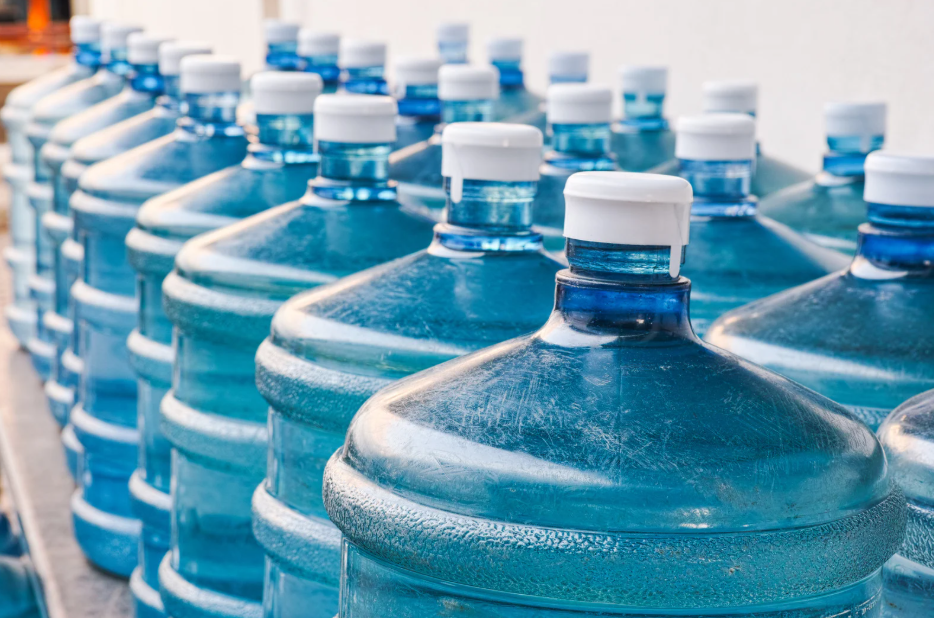
Achieving NSF-60 certification involves a detailed, science-driven process designed to ensure that all drinking water additives meet the strictest safety and performance criteria. Each step verifies that no contaminants, impurities, or byproducts exceed the allowable limits that protect public health.
1. Application and Documentation
Manufacturers begin by submitting detailed product information, including chemical composition, intended treatment function, and maximum use level. This establishes a baseline for safety evaluation and identifies any potential risks early in the manufacturing processes.
2. Formulation Review and Facility Audit
NSF technical experts review product formulations to determine appropriate testing requirements. An on-site audit follows to verify consistency, labeling accuracy, and packaging integrity. The audit also confirms that facility procedures align with NSF-60 quality and traceability standards.
3. Laboratory Testing
Samples undergo rigorous laboratory analysis for metals, volatile compounds, and other impurities. Each chemical’s concentration is normalized to its maximum dosage to verify that it does not exceed the single product allowable concentration (SPAC). This ensures that treated water remains far below federal or state contaminant thresholds.
4. Certification and Ongoing Monitoring
Once products are tested and approved, they are listed publicly as NSF-60 certified. To maintain certification, facilities undergo annual audits and periodic retesting to confirm continued compliance. This ongoing review helps detect formulation changes, prevent adverse effects, and reinforce quality control across production cycles.
Through this transparent, evidence-based process, NSF-60 ensures that every certified additive contributes to safer, higher-quality drinking water—protecting consumers while strengthening trust in the entire supply chain.
Why NSF-60 Certified Additives Are Essential for Public Health
Every drinking water additive used in municipal and industrial systems plays a part in protecting communities from contaminants and disease. However, only those that meet the NSF/ANSI/CAN 60 standard can guarantee that they improve water quality without introducing new risks. These certified products are the result of rigorous testing, transparent manufacturing, and continuous oversight—ensuring that every drop supports both safety and wellness.
The health benefits of using NSF-60 certified water treatment chemicals extend beyond compliance. Certified products reduce the risk of exposure to harmful elements such as lead, arsenic, or volatile organic compounds. They also support sustainability by minimizing waste and ensuring long-term system reliability. This alignment between performance and protection helps utilities deliver consistent, high-quality water that contributes to overall health and community confidence.
By relying on certified chemicals, facilities avoid adverse effects that can occur when unverified or improperly dosed additives enter the system. For end-users, that means safer water, fewer maintenance issues, and cleaner processes throughout the treatment cycle. In short, NSF-60 certification isn’t simply a label—it’s a safeguard for public health and a key element of responsible, future-ready water management.
ETI’s Commitment to NSF-60 Standards
At ETI, NSF-60 compliance is more than a certification requirement; it is a cornerstone of how we blend, test, and deliver safe, effective drinking water additives. With nearly four decades of experience in chemical blending and system optimization, ETI ensures every formulation meets the highest standards for purity, consistency, and safety.
Our certified water treatment chemicals are developed under strict quality controls and verified through continuous testing to prevent contaminants, impurities, or adverse effects in treated water. By aligning our manufacturing processes with NSF-60 and Environmental Protection Agency guidelines, ETI guarantees that every additive contributes to clean, compliant, and reliable drinking water performance.
ETI’s expertise extends beyond production. Through our Potable Water Treatment Solutions, we provide complete support for industrial, municipal, and commercial applications. From disinfection and oxidation chemicals to pH adjustment, scale prevention, and corrosion control, ETI delivers solutions designed for real-world performance.
Our technical specialists also help clients navigate regulatory compliance and system challenges through hands-on training, including ETI Bootcamp and the CWT Certification program. Together, these initiatives reflect ETI’s long-term commitment to education, sustainability, and safe water system management—ensuring every drop reflects the same standard of excellence we’ve upheld since 1986.
Safer Water Through Smarter Chemistry
Safe drinking water additives are the foundation of public health and environmental stewardship. By following the NSF/ANSI/CAN 60 standard, facilities ensure that every treatment chemical enhances water quality without compromising safety or compliance.
At Eastern Technologies, Inc. (ETI), we combine proven chemistry, regulatory expertise, and client-focused service to help businesses achieve reliable, compliant, and sustainable water systems. Whether you need guidance on water treatment chemicals, certification support, or custom formulations, our team is ready to help.
Contact ETI today to discuss your water treatment needs and learn how our NSF-60 certified solutions can help your facility maintain safe, clean, and high-performing potable water systems.
Frequently Asked Questions (FAQs)
Why are NSF-60 certified drinking water additives important in treatment systems?
NSF-60 certification ensures that drinking water additives meet strict standards for health effects, water quality, and system safety. Certified additives are tested to confirm they do not introduce harmful impurities or unnecessary additives during treatment or blending.
How do oxidation chemicals improve potable water quality?
Oxidation chemicals such as chlorine and potassium permanganate remove iron, manganese, and other contaminants, restoring taste, clarity, and safety. When used within the single product allowable concentration, they eliminate risks of corrosion or adverse effects.
What role does pH adjustment play in maintaining safe drinking water?
pH adjustment chemicals help stabilize the water’s acidity or alkalinity, protecting equipment and preventing scale buildup. A balanced pH also ensures smoother operation and consistent water flavor without exceeding safe chemical concentration levels.
How can facilities ensure additives remain compliant over time?
Consistent monitoring, tested formulations, and strict manufacturing processes ensure additives continue to meet NSF-60 standards. Proper documentation and periodic audits protect system reliability and regulatory compliance.
What are the benefits of using certified additives for industrial and municipal systems?
NSF-certified drinking water treatment chemicals enhance sustainability, protect infrastructure, and support public wellness—delivering clean, compliant water for every application, from municipal supply to industrial process systems.


